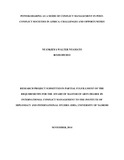| dc.description.abstract | Power-sharing transitional governments are becoming common ingredients of peacemaking and
peace building efforts. Power-sharing as a mode of conflict management in guarantees the
participation of representatives of significant parties in political decision making in the
executive, the legislature, and the judiciary. By dividing power among the rival groups during
the transition, power sharing hypothetically reduces the danger that one party will become
dominant and threaten the security of others. To discuss the concept of power- sharing, the study
uses two models three models for the study. These are: the consociational model which sees
communal groups as the building blocks of a political order based on elite consensus and group
autonomy; the second model is the incentivist model which advocates the design of political
institutions to provide incentives for elite and mass moderation. The third model is the tri-polar
model which brings together the relevant attributes of the consociational and incentivist models,
and highlights the need to broaden the scope of power-sharing to various spheres of governance
such as territorial, economic, and political where groups may want to share power. Data was
gathered by means of reviewing academic published books, journal articles and public
documents on the subject for the relevant concepts and current opinions and policies. The study
findings power-sharing in post conflict societies, may work well in stable democracies when
political elites are moderate and willing to compromise. However, this is unlikely in countries
exiting civil conflict, where leaders are uncooperative and where majority group leaders are
under pressure to not concede to minorities. Thus as a a mode of managing conflict in Africa
such as Kenya and Zimbabwe, it is a successful means of building up a government and end
conflicts that may have cropped in as a result of a flawed electoral process. Power-sharing in
post-conflict contexts are transitional arrangements, but could also become permanent features of
governance architecture. However, power-sharing may be seen as rewarding bad political
behavior and as mechanism in which the alternative scenario could be one of destructive
violence. The danger is that power-sharing are negotiated democracy and could become the end
in itself, rather than a means to an end. | en_US |

